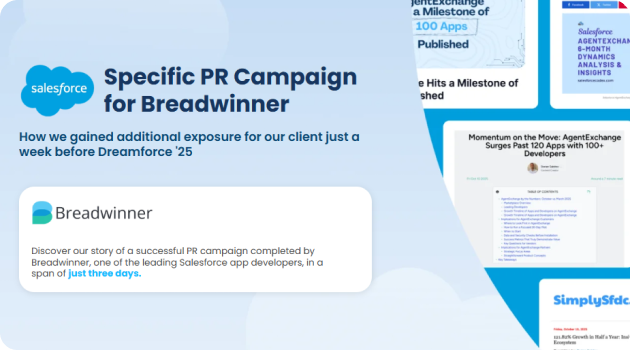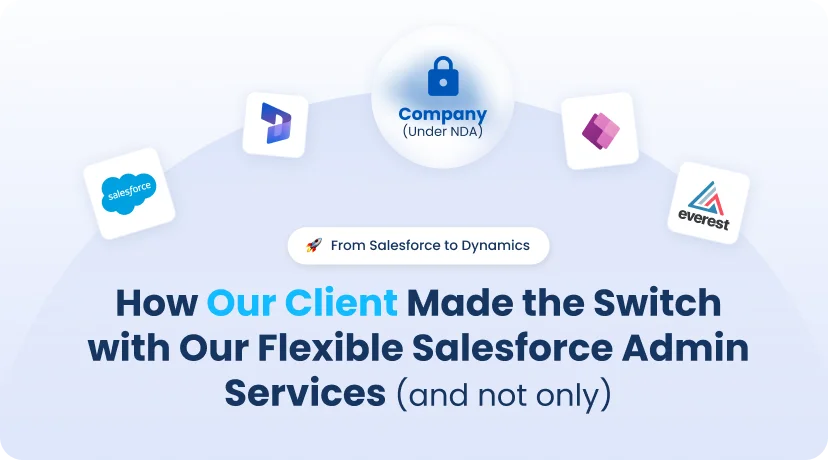
Competition in today’s business world demands providing exceptional customer experiences, making it necessary for organizations worldwide to implement Salesforce, the leading customer relationship management (CRM) platform. To achieve the full potential of Salesforce, organizations need to hire Salesforce developers: talented professionals who are capable of customizing, integrating, and automating CRM solutions according to precise business needs.
The demand to hire certified Salesforce developer has grown with a raging speed in the last few years, while demand has grown at an astronomical rate. The Salesforce ecosystem will generate 9.3 million new jobs by 2026, growing at a compound rate of 28% per annum, as per IDC. LinkedIn’s post by Haroon Chaudhry, CEO and Founder Innovadel Technologies, in 2023 also confirms this: requests to hire expert Salesforce developers have grown by 206% in the last five years, making it one of the world’s fastest-growing IT careers.
Though, firms never find it easy getting Salesforce developer positions within their immediate vicinity. Several firms find it challenging to get certified Salesforce developers due to the lack of talent, especially where the surrounding area is dominated by technology, e.g., the US, UK, Germany, and Canada. Thus, other firms now utilize hire outsourced Salesforce developers, including offshore and nearshore workers, in an attempt to economically complete CRM projects as well as alleviate local resource constraints.
As the regional market faces increasing shortages, an increasing number of businesses choose to hire remote Salesforce developer, taking advantage of global talent pools to accelerate hiring cycles, reduce expenditure, and enhance their CRM capability at minimal cost. This article examines remote, offshore, and nearshore models of hiring extensively to allow companies to make smart strategic choices in order to navigate the Salesforce talent shortage.
- Why More Businesses Hire Remote Salesforce Developers
- Salesforce Developer Positions Available vs Potential Talent Available Comparison
- Top Reasons to Offshore Salesforce Development
- Offshore vs Nearshore Salesforce Developers: Definitions & Key Differences
- Who Are Offshore Salesforce Developers
- Who Are Nearshore Salesforce Developers
- Major Considerations Before Hiring Salesforce Developers
- Benefits of Hiring Salesforce Developers through a Service Provider
- Offshore Salesforce Developer Hiring Costs
- Frequently Asked Questions (FAQs)
- 1. What is the price of hiring an offshore Salesforce developer?
- 2. What are the benefits of hiring a certified Salesforce developer?
- 3. How do I choose between nearshore and offshore Salesforce developers?
- 4. Can I hire Salesforce developers for short-term or project-related purposes?
- 5. What tools support managing remote Salesforce developers effectively?
- 6. How do I ensure data security when collaborating with offshore Salesforce developers?
- 7. How is it different to hiring a freelancer vs hiring through a service provider?
Why More Businesses Hire Remote Salesforce Developers
Overcoming Local Talent Shortfalls:
The majority of the developed countries like the USA, UK, Germany, and Canada are in a critical shortage of qualified Salesforce experts. Due to remote Salesforce development, businesses can utilize a humongous pool of talents across the globe without any geographical constraints and retaining the projects within deadlines. That’s why many choose to hire a Salesforce developer from global locations.
Insight:
According to IDC, companies that offshore Salesforce development report a 35% faster project delivery rate and up to 60% reduction in costs compared to in-house teams. Businesses leveraging global Salesforce talent not only save money but also accelerate their digital transformation.
Cost Reduction and Budget Control:
Remote Salesforce developers are mostly from nations with lower salary requirements due to variations in standards of living, and thus companies can easily reduce operational and salary costs. This cost reduction enables companies to hire Salesforce engineers without compromising on quality.
Greater Flexibility and Scalability:
Organizations become more flexible in managing the resources of projects. By leveraging remote Salesforce developers, including options like nearshore salesforce staff augmentation, organizations are able to scale development teams up or down quickly based on specific project needs, ensuring optimal resource utilization and optimization. This makes salesforce developers hire strategies especially effective for businesses seeking adaptable and scalable talent solutions.
Faster Hiring and Onboarding:
Traditional recruitment processes can be expensive and time-consuming. Remote hiring streamlines the hiring process by eliminating spatial distances, significantly enhancing onboard at good speed. Businesses can onboard Salesforce developer for hire candidates quickly, hence decreasing project delays.
Improved Productivity through Distributed Teams:
Remote Salesforce development teams across different time zones offer extended-hour productivity. This creates enhanced turnaround, uninterrupted workflow, and good management of Salesforce projects, hence business responsiveness improvement.
Salesforce Developer Positions Available vs Potential Talent Available Comparison
The following table summarizes the appalling disparity between available Salesforce job openings and available Salesforce developers in leading global IT markets.
| Country | Open Salesforce Developer Vacancies (2024) | Available Salesforce Developers (2024) | Talent Gap (%) | Source |
| USA | 24,500 | 18,200 | -26% | IDC Report on Salesforce Economy |
| Canada | 5,400 | 3,800 | -30% | Glassdoor – Salesforce Developer Job Statistics |
| UK | 8,200 | 5,500 | -33% | LinkedIn Talent Insights |
| Germany | 7,600 | 4,900 | -36% | Talent.com |
| Netherlands | 3,400 | 2,100 | -38% | Payscale |
As evident from above, developed economies are not faced with any serious lack of indigenous Salesforce experts. In the USA alone, there exists an existing talent deficit of over 26%, and this further worsens in European nations like Germany and the Netherlands (36–38% deficit). With such pressing shortages, businesses opt to hire Salesforce programmers, seeking nearshore and offshore options to provide good project delivery and long-term business growth.
Top Reasons to Offshore Salesforce Development
Offshoring Salesforce development has been an effective strategy for most organizations to outcompete local talent deficits at the cost of minimal resources and costs. Below are the reasons why organizations opt to hire offshore Salesforce developers, each supported by a specific business benefit.
1. Substantial Cost Savings
Offshoring allows businesses to access high-quality Salesforce developers for hire in low-cost countries such as India, China, or the Philippines, where the cost of development is significantly lower than in Western Europe or North America. This can result in saving 60–70% of the cost of development without reducing the quality at all, allowing businesses to invest the savings on other core areas such as marketing or R&D.
2. Improved Access to a Broader Talent Pool
Offshore countries such as Vietnam, the Philippines, and India have a talented and diverse talent pool of Salesforce developers. They have established training infrastructure for Salesforce skills that enable companies to capitalize on specialty expertise that may be hard to hire or even not available locally.
3. Faster Hiring and Team Deployment
The offshore Salesforce development approach typically facilitates quicker access to ready-to-deploy talent. Offshore vendors will typically have a list of ready talent waiting in the wings, thereby avoiding the hiring time necessary to locate Salesforce developers and initiate projects.
4. 24/7 Development Cycle
Offshore developers and internal teams can have varied time zones so that round-the-clock development is utilized. As your local team sleeps, offshore Salesforce developers are working during night hours, providing faster turnaround and lower project delivery cycle.
5. Flexibility and Scalability
Offshore partnerships allow development staff to grow up or down with project needs without long-term contractual obligation. This is particularly important to organizations with different volumes of workloads or having short-duration Salesforce projects.
6. Core Business Functions
Offshoring the development of Salesforce allows in-house staff to concentrate on core business functions such as strategy, sales, and customer interaction while the offshore team concentrates on technical implementation, customization, and maintenance.
7. Availability of Specialized Knowledge
Offshore Salesforce developers or development firms usually have expertise in a particular industry or Salesforce modules (e.g., Agentforce Sales (formerly Sales Cloud), Service Cloud, CPQ). This industry focus can be crucial in providing solutions that are extremely close to business goals.
Offshore vs Nearshore Salesforce Developers: Definitions & Key Differences
When businesses decide to hire Salesforce developers outside their home market, two significant outsourcing models become feasible: offshore and nearshore. Both are beneficial based on the business’s needs, whether the focus is on cost, collaboration, or aligning time zones.
Definitions:
Offshore Salesforce Developers: These developers are physically distant, typically from Asia (India, Philippines, Vietnam) or Eastern Europe (Ukraine, Romania). Offshoring is based on the principle of maximum cost reduction and massive talent pools, typically distant from the client’s site.
Nearshore Salesforce Developers: These developers are located in geographically adjacent countries to the client, frequently being in the same or overlapping time zones. US-based companies’ nearshoring is Latin America (Brazil, Mexico); Western Europe-based companies’ nearshoring is Eastern Europe (Ukraine, Poland). Nearshoring balances cost saving and convenient communication.
Major Differences Between Offshore and Nearshore Salesforce Developers:
| Factor | Offshore Developers | Nearshore Developers |
| Time Zones | Significant difference (6–12 hours) | Minimal difference (1–4 hours) |
| Cost | Lowest cost option (up to 70% savings) | Moderate cost savings (30–50% lower than local) |
| Communication | Requires more coordination due to time differences | Easier real-time collaboration |
| Cultural Alignment | May vary significantly from client’s culture | Generally closer cultural understanding |
| Talent Pool Size | Very large, with deep expertise | Smaller, but often highly skilled |
| Travel Convenience | Longer travel time, higher cost | Shorter, cost-effective travel if needed |
| Project Management | Needs strong remote management processes | Easier oversight and control |
| Connectivity | Reliable, but may vary depending on region | Typically strong, especially in major nearshore hubs |
Choosing the Right Model:
If high cost-effectiveness and access to expert knowledge are top priorities, and your team is accustomed to working on remote projects, offshore Salesforce developers might be ideal. Many companies hire SF developer or an entire development team offshore to maintain 24/7 development cycles and reduce long-term project costs.
If immediate communication, faster collaboration, and easier project management are crucial, nearshore Salesforce developers are a well-balanced choice. This is especially useful for businesses looking to hire Salesforce CRM developer talent without the overhead of managing extreme time zone differences.
Who Are Offshore Salesforce Developers
Offshore Salesforce developers are specialists based in remote geographical locations from the client headquarters, typically with large time differences. Many companies choose to hire offshore Salesforce developers to reduce development costs without sacrificing access to a vast pool of skilled professionals. When businesses decide to hire Salesforce certified developer offshore, they often benefit from highly qualified talent at competitive rates.
Common Offshoring Destinations
- Asia: India, Philippines, Vietnam, China
- Eastern Europe: Ukraine, Romania, Serbia
- Africa: Egypt, South Africa
Common Reasons to Offshore
- Large Salesforce installations that require affordable long-term maintenance
- Continuous development projects where 24/7 working cycles improve speed of delivery
- Competitive pricing for maintenance, customization, and integration services
- Elaborate Salesforce projects not readily found locally
Companies often hire Salesforce programmer in these regions to handle complex technical requirements efficiently and cost-effectively.
Who Are Nearshore Salesforce Developers
Nearshore Salesforce developers operate from countries located near the client’s country, usually not more than a few time zones away. This setup offers a mix of cost benefits and co-location convenience, facilitating easier communication and faster turnaround of projects. Organizations looking to hire Salesforce developers often consider nearshoring as a balanced approach between cost savings and collaboration.
Advantages:
- Time Zone Compatibility: Easy real-time communication with minimal lag.
- Cultural Similarity: Smoother alignment of work habits, business processes, and communications practices.
- Faster Travel: Convenient and inexpensive visits in case face-to-face working is necessary.
- Better Oversight: Better control of teams due to physical proximity.
Disadvantages:
- More Costly Than Offshore: Though lower than domestic staff, nearshore expenses are normally greater than offshore.
- Smaller Talent Pools: Lower numbers of Salesforce developers compared to larger offshore locations.
Target Nearshore Locations:
- For US Clients: Mexico, Brazil, Argentina, Colombia
- For EU Clients: Poland, Ukraine, Romania, Czech Republic
Whether you’re looking to hire Salesforce developers, hire Salesforce certified developers, or specifically aiming to hire offshore Salesforce developer, both offshore and nearshore options provide flexible, cost-effective solutions tailored to business needs.
Major Considerations Before Hiring Salesforce Developers
In preparation to hire Salesforce developers, either offshore, nearshore, or remote, businesses must keep in mind some important considerations to realize successful project returns. The most important of these considerations to keep in mind are as follows:
Salesforce Certifications and Technical Expertise:
Ensure the candidates have the required certifications (i.e., Platform Developer I & II, Salesforce Administrator, Architect) and practical experience in those specific Salesforce products used by your company.
Relevant Industry Experience:
Candidates with the experience in your industry will be best suited to understand your business processes and mold Salesforce solutions in accordance with the same.
Portfolio and References:
Check past projects and client testimonials to see if the developer is capable of providing quality solutions.
Communication Skills and Language Proficiency:
Particularly for distributed teams, there needs to be good communication. Ensure that they are able to explain and get requirements.
Time Zone and Availability:
There needs to be consideration of time zones and working hours should overlap or be compatible so that effective collaboration is possible.
Cultural Fit and Work Ethic:
Good cultural fit can significantly help improve team dynamics, particularly on long projects. Whether you hire Salesforce certified developers or entry-level talent, shared values and strong work ethic contribute to success.
Security and Data Privacy Compliance:
Make sure the service provider or developer adheres to data protection regulatory requirements applicable to your business (e.g., GDPR, CCPA).
Project Management and Delivery Process:
Ascertain their development process (e.g., Agile, Scrum, etc.) and check their compatibility with internal processes. Reliable project delivery is key when you hire Salesforce programmers for critical operations.
Scalability and Flexibility:
Verify the developer or team capacity to scale resources if there are high project demands.
Cost Structure and Payment Terms:
Verify the cost structure (hourly, fixed, retainer) and ensure it fits within your budget with no surprise costs. Whether you’re planning a Salesforce developer hire locally or intending to hire offshore Salesforce developers, transparency in pricing helps avoid surprises.
Benefits of Hiring Salesforce Developers through a Service Provider
Hiring Salesforce developers in conjunction with a professional service provider provides numerous strategic benefits compared to merely searching for technical roles to fill. Some of the reasons most businesses prefer doing so are as follows:
1. Pre-Vetted, Certified Talent at Your Disposal
Professional service providers have a pool of pre-vetted, Salesforce-qualified developers, and you can hire highly experienced and skilled professionals. In this manner, you avoid the risk of hiring less suitable or less experienced talent.
2. Lightning-Fast Onboarding and Deployment
As the service providers have already shortlisted and initiated personnel, they can accelerate the recruitment process to allow companies to start projects sooner, which is otherwise not feasible through conventional hiring.
3. Dynamic Engagement Models
Whether you require a single Salesforce CRM developer or an entire Salesforce development team for hire, providers offer flexible engagement models: hourly, part-time, full-time, or project-based to suit your needs.
4. Flexible Resources
Providers can increase or decrease your team as required based on changing project needs and offer flexibility and cost savings without the administrative overhead of full-time employees.
5. Project Management Support
Most providers employ veteran and committed project managers, offering open communication, timely delivery, and compliance with your business objectives.
6. Lower Operating Overhead
Offshoring through a provider frees remote Salesforce developers from HR management, payroll, and legal compliance, saving time and money.
7. Quality Assurance and Risk Aversion
Established providers will provide performance guarantees, resolution support, and quality control periodic measures to eliminate risks of remote working to zero.
8. Safeguarding Core Business Operations
Outsourcing Salesforce development to experts enables in-house staff to focus on main objectives and core competency, overall performance maximized.
Offshore Salesforce Developer Hiring Costs
Hiring offshore Salesforce developers can be a significant cost-saver, especially when compared to North American, Western European, and Asian-Pacific hub rates. Here is a comparison of top tech markets versus average offshore destinations. Many companies prefer to hire a Salesforce developers from offshore markets to optimize costs while maintaining high-quality development standards.
Hiring Salesforce Developers in USA, Canada vs Brazil, Argentina, Mexico
| Country | Average Annual Salary (USD) | Source |
| USA | $114,618 | Indeed |
| Canada | $107,157 | Glassdoor |
| Brazil | $54,200 | Glassdoor |
| Argentina | $50,414 | Glassdoor |
| Mexico | $46,225 | Jobicy |
Hiring Salesforce developers in North America (USA and Canada) comes with a significantly higher cost compared to Latin American countries like Brazil, Argentina, and Mexico. Organizations looking to hire sfdc developer talent at reduced rates often turn to these regions. You can hire offshore Salesforce developer professionals from Latin America for significant cost savings and still benefit from quality expertise.
Hiring Salesforce Developers in UK, Germany vs Poland, Romania, Ukraine
| Country | Average Annual Salary (USD) | Source |
| UK | $105,000 | Glassdoor |
| Germany | $98,000 | Payscale |
| Poland | $48,500 | Glassdoor |
| Romania | $34,000 | Glassdoor |
| Ukraine | $32,000 | Payscale |
The cost of hiring Salesforce developers in the UK and Germany is considerably higher than in Eastern European countries like Poland, Romania, and Ukraine. This makes Eastern Europe an attractive option for businesses looking to balance quality and cost efficiency when hiring Salesforce development talent.
Hiring Salesforce Developers in Japan, Singapore vs Philippines, China, India
| Country | Average Annual Salary (USD) | Source |
| Japan | $95,000 | Payscale |
| Singapore | $84,000 | Glassdoor |
| Philippines | $12,000 | Glassdoor |
| China | $15,000 | Payscale |
| India | $10,000 | Glassdoor |
Salesforce developer salaries in Japan and Singapore are relatively high compared to the low-cost options available in countries like the Philippines, China, and India. Businesses seeking to reduce costs can consider outsourcing to the latter regions without compromising the quality of Salesforce development expertise.
Frequently Asked Questions (FAQs)
1. What is the price of hiring an offshore Salesforce developer?
Hiring offshore Salesforce developers typically costs significantly less compared to North America or Western Europe. Developers in regions such as India and the Philippines generally offer more affordable rates, making them popular choices for businesses seeking cost-effective solutions. If you’re planning to hire a Salesforce developers for maximum ROI, offshore hiring is ideal. Eastern Europe, while more expensive than India or the Philippines, still offers a more affordable alternative compared to Western Europe. Offshore hiring allows companies to maximize their return on investment without compromising on expertise, as the salaries in these regions are considerably lower than in more expensive markets like the US or the UK, where Salesforce developers can command much higher rates.
2. What are the benefits of hiring a certified Salesforce developer?
Certified Salesforce developers have shown their abilities and knowledge through demanding Salesforce-administered tests. Many companies specifically hire advanced developer Salesforce professionals who have certifications such as Salesforce Platform Developer I & II, Salesforce Administrator, and Technical Architect guarantee the developer works according to best practices, offers efficient, scalable solutions, and is well versed with current Salesforce changes. Hiring certified experts eliminates project slippage, improves code quality, and ensures alignment with your business goals.
3. How do I choose between nearshore and offshore Salesforce developers?
Depending on your priorities. Offshore developers (India, Philippines) offer maximum cost savings and access to the largest talent pools but are tricky due to adaptations required due to time zone differences and issues of communication. Nearshore developers (say, from Mexico, Poland) are physically nearer, allowing for smoother collaboration, faster response times, and better cultural fit, though for a relatively higher cost. In case real-time interaction and zero latency are a priority, nearshore is the ideal choice. If cost savings and skills are the priority, offshore is the choice.
5. What tools support managing remote Salesforce developers effectively?
To manage remote Salesforce teams effectively, companies most often use:
- Project Management Tools: Jira, Trello, Asana
- Communication Tools: Slack, Microsoft Teams, Zoom
- Version Control Systems: Git, Bitbucket
- Salesforce-Specific Tools: Salesforce DX, Gearset for deployment
These tools facilitate open collaboration, real-time updates, and smooth integration between on-site and off-site teams.
6. How do I ensure data security when collaborating with offshore Salesforce developers?
Data security is critical in any remote partnership. Ensure your offshore team:
- Signs Non-Disclosure Agreements (NDAs)
- Uses secure VPN connections
- Compliant with data privacy laws like GDPR, CCPA
- Operates on encrypted machines and secure cloud platforms
Hiring a quality service provider normally implies that there are tight security controls already in place to protect your sensitive information.
7. How is it different to hiring a freelancer vs hiring through a service provider?
Freelancers offer flexibility and lower costs but are less reliable, supportive, and backed up in case of unavailability. Service providers offer structured services, pre-screened staff, project managers assigned, delivery and quality guarantees, as well as scalability, risk reduction, and ongoing support, making them ideal when scaling long-term teams of Salesforce developers to hire. They are best for larger or long-term projects where continuity and accountability are paramount.

Svitlana is a Communications Manager with extensive experience in outreach and content strategy. She has developed a strong ability to create high-quality, engaging materials that inform and connect professionals. Her expertise lies in creating content that drives engagement and strengthens brand presence within the Salesforce ecosystem. What started as a deep interest in Salesforce later transformed into a passion at SFApps.info where she uses her skills to provide valuable insights to the community. At SFApps.info, she manages communications, ensuring the platform remains a go-to source for industry updates, expert perspectives, and career opportunities. Always full of ideas, she looks for new ways to engage the audience and create valuable connections.






 Previous Post
Previous Post Next Post
Next Post